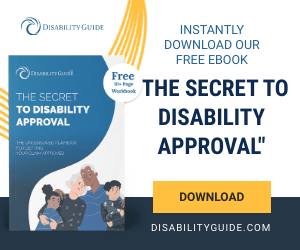Getting Approved
It’s All About the Appeal Process – 4 Levels

The Social Security Administration has an appeals process in place for applicants who disagree with its initial determination. In fact, most people approved for disability benefits had to go through at least one level of the appeal process.
Even if your appeal request for benefits receives a denial at the initial level – don’t fret! Your chances of approval go up after filing multiple appeals.
There are four appeals levels in the Social Security Administration’s disability program.
These four levels are:
Contents
Level 1: Request for Reconsideration
Depending on which state you live in, a request for reconsideration will be the first level of appeals you go through (some states have eliminated this part of the process). A request for reconsideration simply tells the Social Security Administration that you’d like Disability Determination Services to take a look at your case and make a reconsideration decision. It will be assigned for redetermination to a different medical consultant and examiner who were not involved in the initial evaluation of your case, and they will go through the same process they use to evaluate initial claims. You chances of a successful internal appeal at this stage are around five to 10 percent.
Level 2: Administrative Law Judge Hearing
If your request for reconsideration is unsuccessful, you will move on to second level appeal with an administrative law judge hearing. This is the second level of the appeals process. At this stage, your disability claim will go before a judge known as an ALJ who is contracted with Social Security’s Office of Disability Adjudication and Review. During this Level 2 appeal, the judge will evaluate your medical files, work history and day-to-day activities while giving you the opportunity to clarify anything about your case that may seem ambiguous. This ALJ hearing level is your best chance for receiving a positive appeal decision. About 70 percent of claimants are awarded benefits.
Level 3: Appeals Council
If you are not approved for benefits during the administrative law judge hearing, you can appeal your case with an Appeals Council. The Appeals Council doesn’t necessarily review whether you should get benefits, but whether the administrative law judge made a mistake when reviewing your case. This is important to note because the Appeals Council can grant, deny or dismiss your request for a review. If they don’t think the judge made an error, they are likely to just outright dismiss your case. Your chances of a successful approval are very slim at this level; roughly about two to three percent.
Level 4: Federal Court Review
The final step of the appeals process is to sue the Social Security Administration in U.S. district court, where a final decision is made. During this external appeal, a judge from a federal district court will hear your disability case and decide whether any legal errors were made in the process of reviewing your disability claim. They may also take factual questions into account. In fact, it’s not uncommon for them to award you benefits because they decide that the Social Security Administration did not give enough weight to your doctor’s opinion, didn’t consider other conditions/symptoms or should have asked for more assessments. While the federal courts, on average, award benefits in a third of all the cases they see, only about one percent of disability claims actually take their case to court.
If your disability claim is not approved during a federal court review, then you will have to file a whole new claim and re-start the process.
One common frustration among disability applicants is how long it takes to get approved for benefits. Understandable. The appeals process is one of the primary reasons it takes so long (in addition to high caseloads and limited resources). For this reason, it’s important to stay patient, never give up and consult with an attorney to ensure your case is as strong as possible.
Getting Approved
10 Ways to Keep Your Mind Sharp

It’s back-to-school season again. And even if you’re not heading to classes this fall, there are still lots of ways you can develop healthy habits that improve your thinking skills.
By finding simple brain training exercises to keep your mind sharp over the years, you’ll not only improve overall brain health, but also prevent cognitive impairment over time. To give you some ideas, here are 10 things that have been proven to improve brain function and cognitive skills.
1. Get plenty of sleep—Perhaps not the first tip you were expecting, but getting enough rest does an awful lot to keep your mind fresh and invigorated. Plus getting seven to nine hours of sleep consistency has been linked to improved brain function and a significant increase of memory functions. On the flipside, frequent sleep deprivation is also linked to cognitive decline in old age. The relationship may not be causal, but it’s definitely something to think about.
2. Journal by hand—Here’s an interesting fact: did you know that handwriting, the kind that involves a pen and paper and no technology whatsoever, has actually been shown to sharpen your mind? Studies have also found that when you take notes by hand, you are exponentially more likely to remember them afterwards. So if you want to give your mind a workout and remember something, write it down the traditional way.
3. Drink lots of water—Yes, yes, I know how tired you are of hearing this one, but staying hydrated really does improve every aspect of your health, including your long-term mental health. Water cleanses your body and your brain tissues, and it also helps boost your energy, increase alertness, and curb hunger too. A study published in 2006 actually discovered that people who stayed well hydrated and also consumed a healthy diet of fruit and vegetable juices had a decreased risk of developing Alzheimer’s disease.
4. Always continue learning—It stands to reason that the best way to keep your brain in tip top shape is to use it, especially for older adults. You don’t have to be in school to keep learning, so look around for opportunities to try new things. Attend a local seminar. Learn some new software at your local library. Take a meditation class at a community college. Reading new books and interesting articles online is my personal favorite way to keep learning, so do whatever you find most interesting.
5. Break your routine—This might be a hard one if you’re a just-so creature of habit like me. But learning a new skill or just altering your day-to-day routine is actually a great way to stimulate different parts of your brain and prevent both your life and your internal chemistry from going stagnant. I fully give you permission to break out of your shell and do something a little crazy that maybe you’ve never tried before.
6. Use all your senses—All five of your senses are linked to separate parts of your brain, so using all of them regularly is a great way to both stimulate your cognitive abilities and invigorate yourself. Looking at beautiful art, browsing a fancy candle store, trying exotic new foods, and attending a live concert are all great options. Plus unique sensory experiences also boost your memory. Did you know you’re much more likely to remember pictures and experiences when they’re paired with specific scents? Food for thought . . . or your nose I guess?
7. Get some regular exercise—Physical exercise is another great refresher for the brain and has actually been proven to reduce the risk of dementia. So get moving. Living a generally active lifestyle and getting at least 30 minutes of exercise every other day will do wonders for both your physical health and your mental health. Aerobic exercise is also a great break from technology and a good old-fashioned way of increasing blood flow and lowering your stress levels naturally.
8. Stimulate your brain—If you’ve heard any advice about keeping your mind sharp, it’s probably this one. A brain game is a fantastic way to challenge your brain cells and reduce your risk of age-related memory loss. So give some a try. Sudoku is my personal favorite, but crossword puzzles, Mah Jongg, and brainer teasers like these are great too. Remember the key is to introduce novelty to your brain, plus the feeling of accomplishment when you defeat a particularly tricky puzzle is well worth the effort all on its own.
9. Believe in your healthy brain—There are a lot of myths about memory loss wandering around out there, and it’s actually in your best interest not to believe what you hear. Studies have actually shown that people who feel stress about losing their memory or put too much stock into mental decline stereotypes are much more likely to experience mental decline and memory-loss difficulties. So give your brain power the benefit of the doubt.
10. Don’t be too hard on yourself—Along with believing in your brain, be kind to yourself and take it easy on your memory skills. Everyone has little slip ups and moments of forgetfulness, so don’t beat yourself up for being human. Feel free to invest in a good planner to help you remember things, and keep in mind that forgetfulness is sometimes a sign that you’re packing too much into your brain. So give yourself the freedom to forget the little things that really don’t matter all that much in the long run.
Want to read more healthy living tips? Try this one on seven ways to beat your stress or this one about all the virtues of drinking more water. Some of them might surprise you.
Getting Approved
Quick Tip: List Your Attorney as a Contact for the SSA

As you’re preparing your application for Social Security Disability, one of the best things you can do to help your case is to list your disability attorney. Every application has a section for relevant contacts that the SSA can ask about your case, and who better to have them call than the person who knows the most about getting you approved?
Keeping an open line of communication between the SSA and your disability attorney is arguably the number one thing that will get your application through on the very first try for all kinds of reasons:
1. Your disability attorney is intimately acquainted with your case. Because of this he or she will be able to answer the SSA’s questions in a way that will accurately and effectively represent you.
2. Your attorney knows the SSA lingo. While your close friends or your family doctor might know an awful lot about your condition, your attorney is the one who will know how to translate your case into terms that will make sense to the SSA—and increase your chances of approval.
3. They’ll know how to handle any obstacles that arise. If your attorney is in regular contact with the SSA, he or she will be right there to resolve objections and stop approval-killing obstacles before they become a reason for your application to be denied.
4. Your attorney knows what NOT to say. There are things that will improve your case and also things that will not improve your case. Since your disability attorney is familiar with the ins and outs of approval, they need to be right on the front lines to help you steer your application to success. Why else would you have hired them?
For even more fantastic benefits of working with a disability lawyer, check out this great blog post.
Getting Approved
Can Social Media Activity Affect My Disability Case?

In the age of social media, nothing is private anymore. Every day, millions of people from older adults to adolescents upload personal information about themselves and their social relationships. Most of the time, we do it without thinking about how their social media posts could be used by others.
If you are filing for Social Security Disability benefits, you should be highly aware of what you are posting on social media sites. Even things that may seem innocuous have the ability to affect a disability examiner or administrative law judge’s opinion about your disability claim and your status as a disabled person.
While the Social Security Administration has official rules prohibiting examiners and judges from searching the Internet for information about disability applicants, that doesn’t mean it never happens. It just means that social media activity cannot be cited as a primary reason for denial in a disability decision. Public information about you could still be found, and could color a case evaluator’s perception of your claim.
We’re not trying to scare you off Facebook and Twitter forever. Social networking and following the right influencers can be a beneficial source of social support within the disability community. We just want to you to be aware of what information is publicly visible on your social media accounts. As long as you’re being honest about your disability issues, mental health, physical activity, and functional limitation on your Social Security Disability application, you shouldn’t have any problems. But just in case, you may want to do an audit of your social disabled community to see what information about you is publicly available.
Delete anything you feel could affect your case for benefits. Even an innocent status update posted in jest such as “love all this free time I have waiting for disability benefits,” could raise some eyebrows by the Social Security employees evaluating your claim.
Once you’ve cleaned up your social media sites, consider making them private if you haven’t done so already. Not just because you are applying for disability benefits, but because it’s simply a good idea for your protection. You never know how people will use your information, and the last thing you want is for it to fall into nefarious hands.
Finally, as you move through the disability process, be mindful of what you are sharing and how a disability examiner or administrative law judge could react to it. While your profile may be set to private, there are other ways it could end up in front of public eyes.
In the end, your social media accounts probably won’t have much of an impact on your Social Security Disability case, but it’s better to be safe than sorry. If you have any concerns about your claim for disability benefits, including whether your social media activity could be hurting your case, you should consult with an experienced Social Security disability attorney.
Curious on what other behaviors might have a negative impact on your Social Security Disability claim? You’ll definitely want to read our article with “10 Things You Shouldn’t Do When Filing for Social Security Disability.”
-

 About SSI & SSDI10 years ago
About SSI & SSDI10 years ago6 Different Types of Service Animals
-

 Getting Approved10 years ago
Getting Approved10 years agoWill Medical Marijuana Affect My Social Security Disability Case?
-

 About SSI & SSDI10 years ago
About SSI & SSDI10 years agoHow the Social Security Blue Book of Impairments Can Affect Your Disability Claim
-

 About SSI & SSDI9 years ago
About SSI & SSDI9 years agoSSDI or SSI: What Makes These Programs Different?
-

 Getting Approved10 years ago
Getting Approved10 years agoQuick Tip: List Your Attorney as a Contact for the SSA
-

 News9 years ago
News9 years agoWhy Would You Need to Contact the SSA?
-

 Getting Approved10 years ago
Getting Approved10 years agoCan Social Media Activity Affect My Disability Case?
-

 Getting Approved10 years ago
Getting Approved10 years ago10 Ways to Keep Your Mind Sharp


